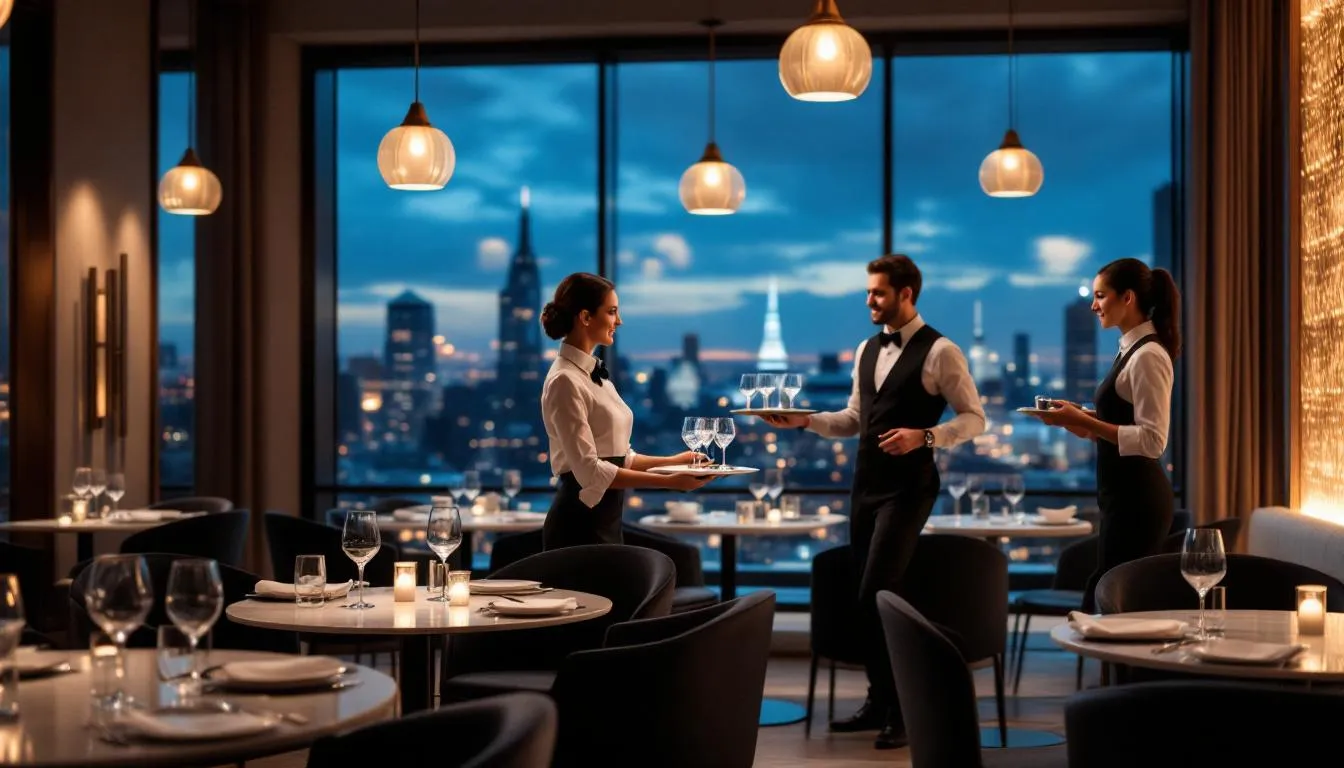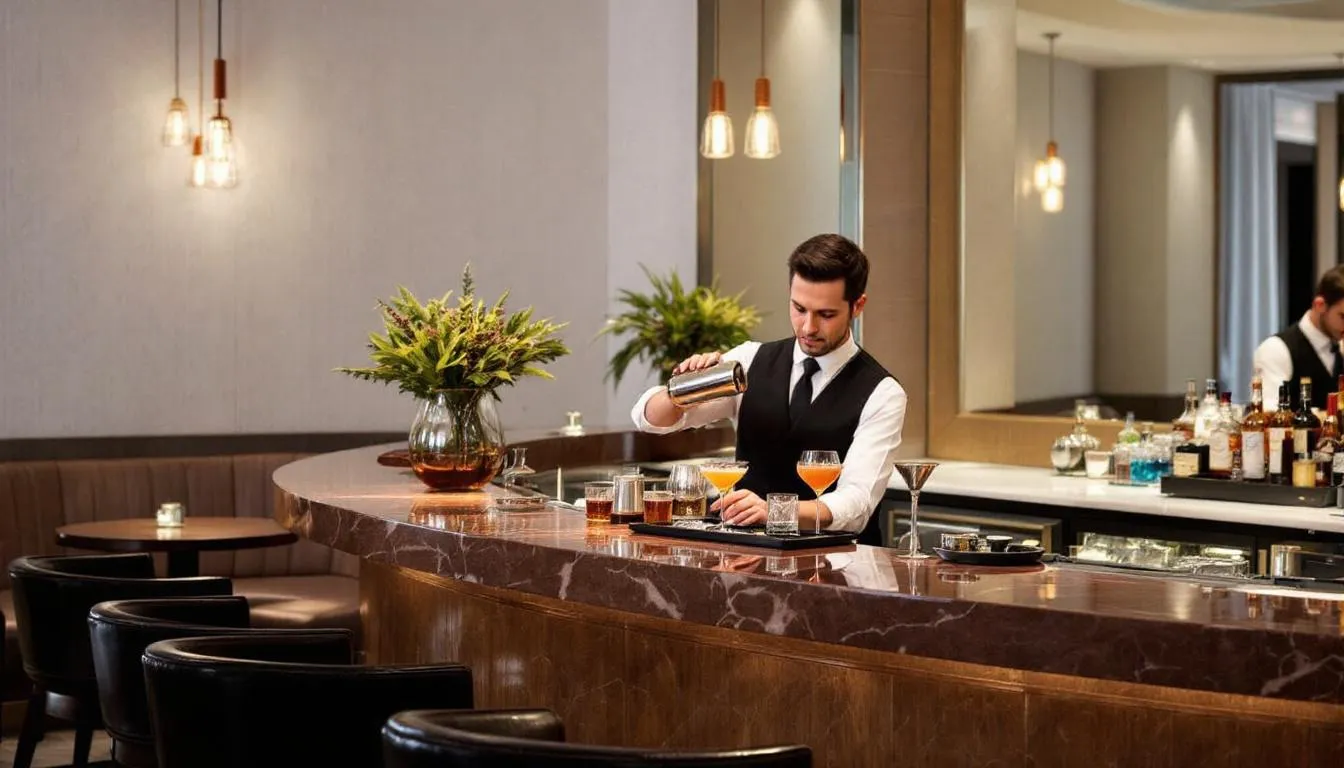F&B Hotel: Complete Guide to Food & Beverage Operations
 Mika Takahashi
Mika Takahashi Mika Takahashi
Mika TakahashiThe food and beverage (F&B) sector has evolved dramatically from being just an extra perk offered by hotels. Today, it’s a powerful driver of success, contributing significantly to a property's overall performance. In fact, in today’s competitive hospitality market, F&B hotel operations can bring in around 25% of a hotel’s total revenue. That makes them absolutely essential—not just for profitability but also for creating memorable guest experiences.
Whether you’re a seasoned hospitality professional or stepping into hotel management for the first time, understanding the ins and outs of F&B operations is key. This guide will walk you through everything—from the basics of running hotel food and beverage services to the latest trends shaping the industry. By mastering these elements, you can boost guest satisfaction and maximize your hotel’s revenue potential.

When we say F&B, or Food & Beverage, we’re talking about all the food and drink services a hotel offers. This covers a broad range—from full-service restaurants and lively bars to room service, event catering, and even minibar offerings. Over time, F&B has shifted from being a simple amenity to a major attraction that can influence a guest’s choice to book and even impact the hotel’s overall value.
Typical F&B hotel operations include:
Hotels today recognize how exceptional F&B hotel services create lasting memories and build loyalty. Partnerships with celebrity chefs, innovative dining concepts, and a focus on locally sourced ingredients are just some ways hotels stand out in this crowded space.
Statistics reveal that hotels managing their food and beverage operations in-house typically generate 20-30% of their total revenue from these services. Luxury hotels often see even higher figures, highlighting just how vital F&B hotel is to the overall hotel business strategy.
Hotel food and beverage operations do more than just sell meals and drinks—they’re a major financial pillar. Well-run in-house F&B services can contribute up to a quarter of a hotel’s total revenue. Moreover, properties with strong F&B offerings often enjoy higher average daily rates (ADRs) and improved property valuations.
Group events play a big role here, often making up about half of the F&B revenue in many upscale and luxury hotels. Meeting spaces and catering services attract corporate clients and social gatherings alike, providing steady income and excellent upselling opportunities.
Here are some key financial highlights to consider:
| Metric | Industry Performance |
|---|---|
| Revenue Contribution | 20-30% of total hotel revenue |
| Profit Margin Growth | Increased from 24.9% to 29.5% (2010-2016) |
| Group Business Share | ~50% of F&B revenue at upscale properties |
| Site Selection Ranking | 3rd most important factor for event planners |
Hotels often leverage their F&B offerings to enhance the guest experience, turning dining into more than just a meal—it becomes an experience. Properties with acclaimed restaurants or unique culinary concepts can command premium room rates and attract guests who might otherwise book elsewhere.
The beverage sector is particularly profitable. Bars and lounges enjoy higher margins than food service, and smart beverage programs featuring craft cocktails and local brews can significantly boost beverage revenue while enhancing guest satisfaction.
Revenue management teams increasingly use F&B strategically, optimizing yield by promoting dining reservations and special culinary events to fill rooms during slower periods and encourage longer stays.

The hospitality food scene is evolving rapidly, and several exciting trends are influencing how hotels approach their food and beverage services this year. These trends reflect changing consumer preferences, a growing commitment to sustainability, and technological advances.
Plant-based options have moved from niche to mainstream. Vegan and vegetarian dishes, along with functional foods enhanced with probiotics and adaptogens, are now common on hotel menus. Guests are increasingly interested in meals that promote their health and well-being.
Hotels are sourcing ingredients locally more than ever before. This reduces transportation costs and environmental impact while allowing hotels to showcase authentic regional flavors. It’s a win-win that appeals to environmentally conscious guests and enhances customer satisfaction.
With nearly two-thirds of leisure travelers sharing their dining experiences on social media, hotels are designing dishes and dining spaces that look as good as they taste. Instagram-worthy plating and photogenic environments have become powerful marketing tools, extending the reach of a hotel’s brand beyond the property.
Convenience remains king. Hotels are expanding takeout and delivery services, often partnering with external providers or enhancing their own room service offerings. These additional revenue streams meet guests’ expectations for flexible dining and help hotels capture more business.
Hotels are paying closer attention to a wide range of dietary needs—from gluten-free and allergen-friendly meals to culturally specific dishes. This level of care boosts guest satisfaction and widens the property’s appeal.
Other trends include experiential dining, where meals become events through interactive cooking demos, wine tastings, and chef’s table experiences that guests remember long after they leave.
Technology is transforming hotel food and beverage operations, improving efficiency and elevating guest experiences. The hospitality sector is embracing digital tools to overcome labor shortages while maintaining high service standards.
Artificial intelligence helps hotels offer hyper-personalized dining experiences by analyzing guest preferences, dietary restrictions, and past orders. This technology not only delights guests but also aids inventory management and reduces food waste.
Mobile apps and QR-code digital menus allow guests to order directly from their phones. This reduces wait times and provides hotels with valuable insights into consumer preferences and market trends.
Modern POS solutions like Tableview POS integrate seamlessly with hotel management software, offering real-time inventory tracking, automated cost control, and detailed revenue analytics. These tools streamline kitchen operations and sharpen financial oversight.
To tackle labor shortages and maintain consistency, more hotels are adopting automation. Robots assist with food prep, beverage service, and even deliveries in some properties, helping staff focus on personalized guest interactions.
Smart room technologies enable guests to place orders via voice or apps, making in-room dining seamless and convenient—especially appreciated by business travelers and those valuing ease.
Hotels that integrate these technologies often see improved customer satisfaction and a healthy boost in F&B hotel revenue.
Running a successful food and beverage operation requires juggling many components—from sourcing ingredients and managing inventory to food prep and guest service. Mastering these basics is essential for optimizing your hotel’s F&B performance.
Effective F&B hotel operations coordinate:
Hotel F&B teams typically include:
Front-of-House:
Back-of-House:
Leadership Roles:
Keeping a close eye on inventory helps boost profits by cutting waste and controlling food costs. Sophisticated systems track usage, monitor freshness, and optimize ordering. Just-in-time procurement and working with multiple suppliers are common strategies.
Financial management includes smart menu design to maximize margins, dynamic pricing based on demand, and detailed cost analysis to spot improvement opportunities. Revenue management techniques are increasingly applied to F&B hotel, adjusting prices for peak times and special events.

Being eco-friendly is no longer optional—it’s a must for hotel food and beverage operations. Guests expect it, and it often leads to cost savings and a stronger brand reputation.
Food waste is a significant challenge, with some kitchens discarding nearly half a kilogram per plate. Leading hotel groups have set ambitious goals to cut waste by 30-50% through better forecasting, portion control, and donations.
Effective strategies include:
Hotels prioritize locally sourced, seasonal ingredients to reduce their carbon footprint and support local economies. Many are also switching to eco-friendly packaging, replacing single-use plastics with biodegradable or recyclable alternatives.
Sustainability initiatives not only align with consumer demands but also create additional revenue streams by appealing to environmentally conscious guests.
Food and beverage operations are no longer just a hotel amenity—they’re a vital part of a property's identity, profitability, and guest experience. By staying ahead of market trends, embracing technology, and committing to sustainability, hotels can truly exceed expectations and create memorable dining experiences that keep guests coming back. Whether you’re running a boutique beach resort or a luxury urban hotel, mastering F&B hotel operations is key to thriving in today’s hospitality industry.